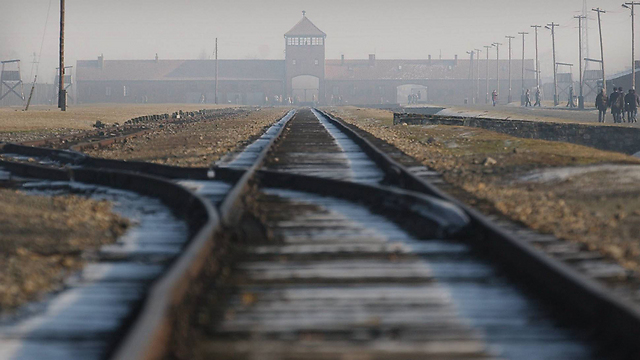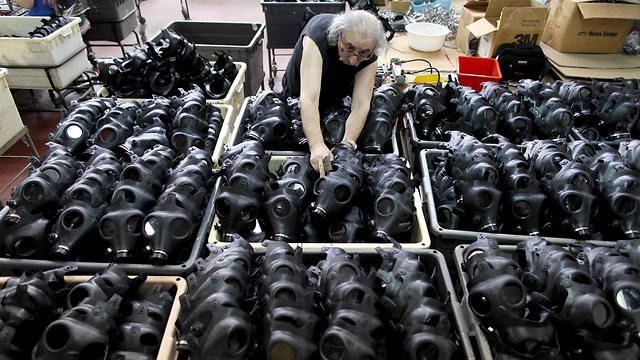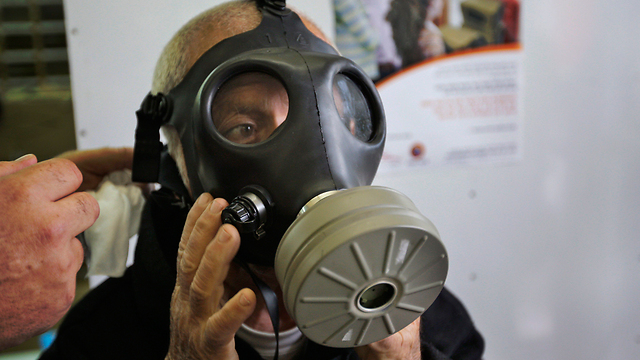The Defense Ministry, Israel Police, Israel Prison Service and the Firefighting Commission have all for years been using HazMat gear manufactured by two German companies that also provided gas masks to Nazi soldiers operating the gas chambers at Auschwitz.
Since the 1967 Six-Day War, Israel has been acquiring gas masks and filters from two German companies, which, it now transpires, also provided the Nazis with the masks used to protect themselves at the gas chambers in Auschwitz.
The companies are Dräger, a family-owned company from Lübeck, and another formerly known as Auer, which was acquired in 1958 by the American company MSA, but its Berlin factory remains active.
These companies have been selling gas masks and filters to the Israeli market for years and are exempt from having to participate in a tender.

Among their clients are the Defense Ministry, the Firefighting and Rescue Commission, Israel Railways, the Israel Police and the Israel Prison Service.
The companies’ involvement with the Nazi regime was revealed in a study by the Yad Vashem Holocaust Museum in Jerusalem, which is based on a book by French scholar Jean-Claude Pressac, who researched the gas chambers in Auschwitz. The book describes in great detail how the SS soldiers operated the gas chambers and what substances and equipment they used.
According to Pressac, every Nazi soldier who was involved in the extermination of the Jews was equipped with a gas mask. The Nazi army used type GM 38 masks manufactured by Dräger, while the filter for the mask was manufactured at the Auergesellschaft (Auer) factory in Berlin.
The GM 38 masks were used by the Nazi army starting in 1938 to protect the soldiers from chemicals on the battlefield. The masks were produced in different colors—for example, sand-colored for the troops stationed in Africa—and were very advanced for the time, as they were also equipped with microphones. Some of the masks were also used by Nazi pilots.
The mask’s J type filter was used to protect the Nazi soldiers from Zyklon-B, the gas used for the extermination of the Jews.
A German document found in the book, titled “Directives for the use of prussic acid (Zyklon) for the destruction of vermin (disinfestations),” provides safety instruction to the Nazi soldiers: “When fumigating with Zyklon use only special filters, e.g. the filter insert ‘J’ (blue brown) of the Auergesellschaft Berlin or of the Draegewerke, Luebeck. Should gas seep through the mask, leave the building immediately and change filters after also checking the mask and its fit to see whether they are tight.”
Business with Israel
The dark chapter in the two companies’ history did not stop government and public institutions in Israel from acquiring masks and filters from them for dozens of years. The Israel Police, for example, purchased the breathalyzers from Dräger.
Some of these government and public bodies also issued tenders for the maintenance and inspection of the equipment that indicate it was manufactured by the two companies. The Israel Railways, for example, issued a tender for the “maintenance and routine inspection of self-contained breathing apparatuses manufactured by MSA.” The Firefighting and Rescue Commission issued a tender for “kits and parts for audio and speaking for self-contained breathing apparatus masks manufactured by MSA.”
The Israel Police, meanwhile, issued a bid for “the maintenance of HazMat self-contained breathing apparatus equipment manufactured by Auer,” “maintenance of self-contained breathing apparatus by Dräger,” and “maintenance of HazMat gear, protective suits, self-contained breathing apparatus masks from Dräger.”
A book by Amos Gazit, whose company distributes Dräger’s products in Israel, reveals more details about Israeli acquisitions from the two companies.

Amos Gazit Ltd. began importing gas masks and other HazMat gear from Germany back in the 1950s. Four days before Israel’s Independence Day in 1967, as tensions were mounting in the country in the months that preceded the Six-Day War, Gazit was in Copenhagen. He writes in his book that he received a phone call from a senior official in Israel’s Defense Ministry who told him, “Drop everything and go immediately to the Dräger factory in Lübeck. Within 48 hours, you will receive a list of equipment we need immediately. On Tuesday, you will be joined by someone at breakfast who will identify himself using a codename. This is a sensitive matter; we don’t want to fall into any traps.”
Gazit changed his travel plans and arrived in Lübeck the next day. A man with a codename handed Gazit a long “shopping list” during breakfast at the hotel and explained to him the importance of acquiring the items on it. At another table at the back of the room waited a representative from Dräger—Mr. White.
“The difficulty was in getting gas masks and filtration systems for the larger shelters and equipment for the NBC protection system at the IDF high commander’s bunker, where Chief of Staff Yitzhak Rabin was situated. Among the items were also gas masks for civilians,” Gazit wrote.
The Dräger representative refused to fulfill the order, claiming that company CEO Dr. Henrik Dräger did not approve of the deal. Gazit asked to speak to Dräger, and the two met in the CEO’s home. During their meeting, Dräger showed Gazit a letter signed by a senior official in the German government that read, “Dear Henrik, I ask you to not provide even one gas mask to Israel.” Gazit asked him when was the letter from, and received the answer: “Last night,” to which Gazit responded: “Excellent. We agreed on the deal on Monday, and today is Friday.”
According to Gazit, “Dräger withdrew into himself, poured a glass of wine, picked up the phone and said, ‘Please start packing up the masks.'”
The Israeli Defense Ministry then sent an El Al plane to Hamburg to pick up the equipment.

During the first Gulf War, soon after Iraq’s invasion to Kuwait in 1991, Gazit ordered gas masks from Dräger. “I bought the entire stock and even before the IDF started distributing masks, I sold everything I had,” Gazit wrote.
About three months after the war broke out, the IDF needed to change six million filters, purchase protection kits for babies and protective airhoods, and restock its warehouses with more masks. Military representatives sent by then-IDF Chief of Staff Dan Shomron met with Dräger representatives, including with Dr. Dräger himself in Germany, following which a contact was signed for an order of 2.1 million filters from the company.
In 1992, Dräger opened a factory in Israel to service the protection kits. Dr. Dräger, Israeli officials and senior officials in the Defense Ministry attended the factory’s opening. After the servicing project was complete, the factory was closed down and moved back to Germany.
MSA, meanwhile, aided in setting up factories in Israel to manufacture gas filtration systems for the defense establishment.
‘Some of the best products in the world’
Dräger said in response, “Since our establishment in 1889, we have developed equipment, systems and services that protect, support and save human lives. These products are being used for security and public safety purposes. After the Nazi party came to power in 1933, Dräger received a growing number of orders from the German Defense Ministry to develop what was then said to be gas masks for civilians.”
MSA said in response: “As a company whose foundations are based in ethics, decency and the commitment to protect people, MSA strongly condemns the horrors Nazi Germany committed against humanity. For over 100 years, our sole mission has been to protect the well-being and safety of people worldwide. MSA’s masks helped in keeping firefighters, police officers, emergency teams, industrial workers and soldiers—including in the Israeli army—from harm. The American MSA did not provide the Germans with equipment during World War II, it acquired the Auergesellschaft factory in 1958, long after it was no longer providing gas masks to the German army.”
The Firefighting and Rescue Commission said in response: “We acquire life-saving breathing equipment from the two companies because these are quality products, among the best in the world. The Firefighting and Rescue Commission does not issue recommendations to security bodies to acquire this gear.”
The Defense Ministry said in response: “The two companies are licensed providers of the Defense Ministry. We are unfamiliar with the claims about their past history.”
Likud MK Oren Hazan is currently working on a bill to prevent in the future the purchase and use of equipment from companies that worked with the Nazis.
As reported by Ynetnews
